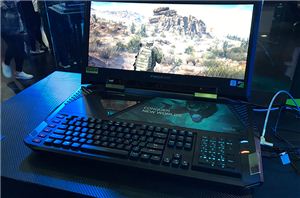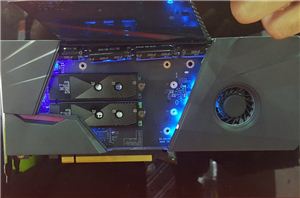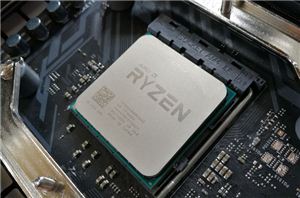A USB Stick as an SSD? A New Silicon Motion SM3282 Single-Chip Controller for USB SSDs
by Anton Shilov on May 31, 2019 3:00 PM EST- Posted in
- SSDs
- Storage
- Silicon Motion
- 3D NAND
- External SSDs
- Computex 2019
- SM3282

Silicon Motion has introduced its first single-chip controller for portable USB SSDs. The SM3282 promises to enable makers of portable drives to offer up to 400 MB/s sequential read speeds in a cost-efficient manner previously unachievable by external SSDs.
Silicon Motion’s SM3282 chip packs a USB 3.0 (aka USB 3.2 Gen 1) controller alongside an SSD controller featuring 2 NAND channels with 4 CE (Chip Enables) per channel, integrated 3.3V/2.5V/1.8V/1.2V voltage regulators, and other necessary things. The chip comes in a 68-pin QFN package and supports the latest types of 3D NAND memory (including 3D TLC and 3D QLC memory featuring up to 96 layers) from all leading suppliers of flash. It also supports both USB Type-A as well as USB Type-C connectors.
Previously, makers of external SSDs had to use a USB-to-PCIe bridge alongside an SSD controller to build their products, which greatly increased BOM costs as well as the final price. The SM3282 packs all the necessary functionality into a single chip and thus reduces BOM cost of external SSDs.
As far as performance is concerned, the SM3282 can enable external SSDs featuring up to 400 MB/s sequential read and write speeds. Meanwhile, producers of actual SSDs tend to use different types of memory with different interface speeds, so performance of actual devices will vary.
This week Silicon Motion is demonstrating prototype external SSDs based on the SM3282 at Computex. Expect commercial drives powered by the controller to be available in the coming quarters at a variety of price bands.
| Want to keep up to date with all of our Computex 2019 Coverage? | ||||||
 Laptops |
 Hardware |
 Chips |
||||
| Follow AnandTech's breaking news here! | ||||||















46 Comments
View All Comments
DanNeely - Saturday, June 1, 2019 - link
You can make shorter ones with only 2 flash dies instead of 4, or possibly put 2 on the backside of the PCB, or stack 2 shorter PCBs. But SM is intending this to be for higher performance drives; and more flash chips gives more potential performance via increased parallelism; which means it's probably not going to be seen in smaller more compact models.chipped - Friday, May 31, 2019 - link
Seems like it will be a flop, Sandisk has had drives with the same performance for years. What’s so exciting about these?Valantar - Saturday, June 1, 2019 - link
Price. Single-chip solutions can be dramatically cheaper than multi-chip ones. Flash will still be the biggest cost, but this could shave a decent chunk off still.PixyMisa - Friday, May 31, 2019 - link
With 10Gb or 20Gb USB this would be a big deal, because it would provide something better than SATA. As it stands it's a a big ball of meh.psychobriggsy - Monday, June 3, 2019 - link
If it reduced the cost of USB SSDs, and it is bootable, then this could be a neat way of having 'good enough' performance for portable system drives (e.g., when you need to borrow a computer and want your own OS and files). For all three people that need this functionality...Shame it's not USB 3 Gen 2 (10Gbps), but if this is aiming for cost.
Beaver M. - Saturday, June 1, 2019 - link
It was already tried to get these speeds onto USB thumb drives, right after USB 3.0 was released. Its just not possible, because of the physical limit to deal with the temperature.You cant get the heat off small things like that well enough. The result is early failing components.
Many manufacturers claimed they would deliver 400+ MB/s write/read, but that was never possible. Many products were announced, but never went to the public. Others did come to the public but were axed quickly again because of the high failure rate.
And then there were ones with a SandForce Controller, which claimed they were that fast, but they were only that fast with compressible content, which is basically a lie, because there isnt much content that is compressible and usable on sticks like that.
Youre better off buying USB drives like the Samsung M-Series. They are bigger, but at least they can reach those speeds, yet if you write a lot onto it in one swipe at maximum speed, it will still throttle after a while.
Valantar - Saturday, June 1, 2019 - link
... so there's no chance that there's less heat from better production nodes? That sounds improbable. Also, they could just make better casings, with decent cooling taken into account.Beaver M. - Saturday, June 1, 2019 - link
They get far too hot. Even modern uncooled SSD controllers go to 100C. Why do you think M.2 SSDs have cooling now? And they are about as big as these. The first generations didnt, and all throttled after continued load, but at least they werent packed into tiny cases that trapped the heat and damaged other components.If you build in proper cooling, then the USB stick will be much larger and then wont be the size we knew so far. These things in the picture are already huge.
From size alone, I would rather get a Samsung M-Series SSD, than such a giants thumb drive.
Valantar - Saturday, June 1, 2019 - link
This is _far_ lower performance - and thus power draw - than an NVMe SSD. And saying those "go to 100C" is just plain wrong - my 960 Evo gets a bit toasty in the high 60s, but that's it. Sure, it would get hotter in an uncooled casing, but adding a thermal pad and some ridged aluminium fixes that unless you're pounding your drive with tens of GB of writes at max speed all the time. And if that's your use case, an actively-cooled DAS might be a better solution for your needs anyhow. Will this - like all flash drives - get hot under sustained writes? Sure, no doubt. Will it matter? Likely not at all, neither for performance or longevity.Beaver M. - Sunday, June 2, 2019 - link
I was talking about the controller, not the NAND or the temperature sensor of the SSD. SSDs temperature sensor is most of the time somewhere between the NAND and the controller. Know the difference...It matters a lot. You just ignored everything I said. They broke because of the heat. Period. Otherwise we would have had 400 MB/s thumb drives long ago, and much faster.
If you have an SSD that achieves 3000+ MB/s and then tell me I have the audacity to use that speed, then its obvious its useless to continue with you.
My god, why do you guys always base your ego on crap like this?